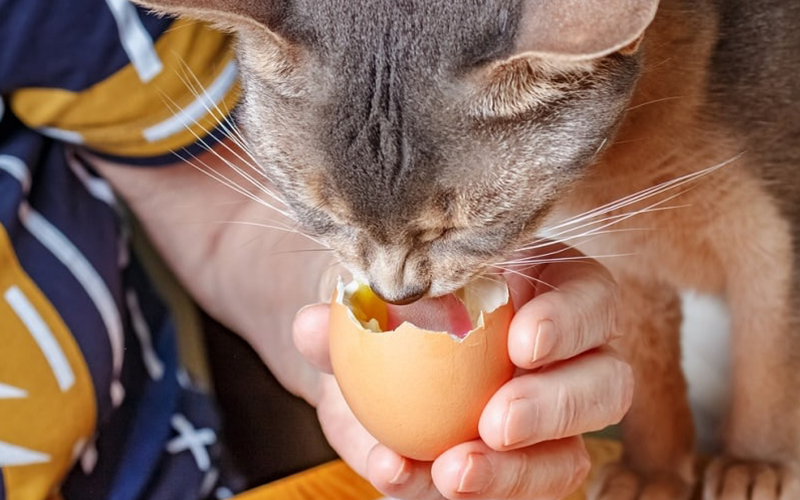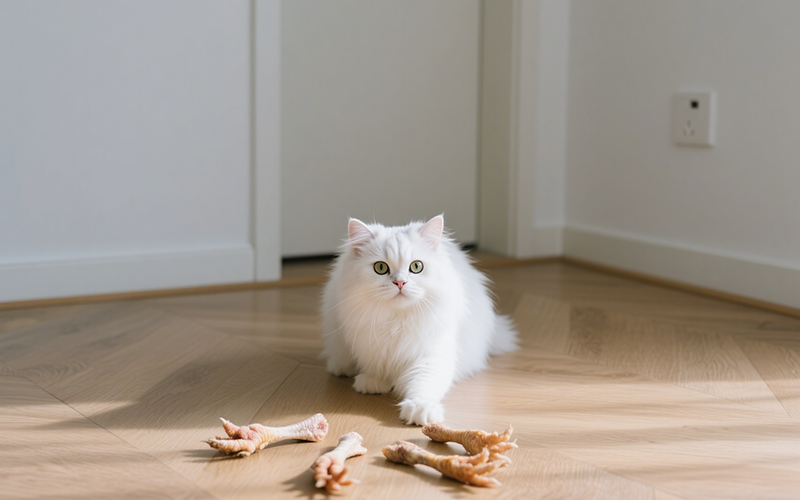Can Cats Eat Raw Eggs? Understanding the Risks and Benefits for Your Feline
- 21 Feb 2025 15:42
Raw eggs are a common food in many households, especially for people who enjoy making fresh dishes like homemade smoothies or baking recipes. But when it comes to feeding your cat, the question arises: "Can cats eat raw eggs safely?" While eggs are a nutritious food source for cats, raw eggs come with certain risks that need to be carefully considered.

The Potential Benefits of Eggs for Cats
Before we dive into the risks of raw eggs, let’s look at why eggs can be a healthy addition to a cat’s diet when cooked properly:
High-Quality Protein
Eggs are an excellent source of high-quality protein, which is essential for cats. As obligate carnivores, cats rely on protein to maintain muscle mass, support their immune system, and promote healthy organ function. Eggs are rich in amino acids, which are the building blocks of protein.Rich in Nutrients
Eggs contain a variety of beneficial nutrients, including vitamins like A, B12, and riboflavin, and minerals such as iron, selenium, and zinc. These nutrients support overall health, including skin and coat health, and promote a strong immune system.Healthy Fats
The fat content in eggs provides energy for your cat and helps support healthy skin and a shiny coat. The fats in eggs are primarily monounsaturated and polyunsaturated, which are beneficial fats that help maintain a balanced diet.Digestibility
Cooked eggs are highly digestible, meaning they’re easy for cats to process and absorb the nutrients. Cats typically tolerate cooked eggs well, and they can be a good option for a protein boost when given in moderation.
The Risks of Feeding Raw Eggs to Cats
While cooked eggs can be a healthy treat for cats, raw eggs pose several risks that need to be considered:
Risk of Salmonella
One of the most significant risks of feeding raw eggs to cats is the potential for salmonella infection. Raw eggs can be contaminated with salmonella bacteria, which can lead to food poisoning. Infected cats may experience symptoms like vomiting, diarrhea, fever, and dehydration. Humans can also contract salmonella through handling raw eggs or coming into contact with contaminated cat feces.Risk of Biotin Deficiency
Raw egg whites contain a protein called avidin, which can bind to biotin (a B-vitamin) and prevent its absorption in the body. Biotin is important for maintaining healthy skin, fur, and metabolism. When large amounts of raw egg whites are consumed over time, it can lead to a biotin deficiency, resulting in skin problems and hair loss in cats. Cooking the eggs deactivates avidin, making the egg safe for consumption.Digestive Upset
Raw eggs may be harder for some cats to digest compared to cooked eggs. If your cat has a sensitive stomach, consuming raw eggs might lead to gastrointestinal upset, including vomiting or diarrhea. This is more likely if they consume large quantities or if the eggs aren’t fresh.Potential Choking Hazard
If you’re offering raw eggs to your cat in the shell, it’s important to note that the shell itself can be a choking hazard, particularly for small cats. Some cats may not chew the eggshell thoroughly, which could cause an obstruction. It’s safer to crack the egg open and serve it without the shell.
How to Safely Offer Eggs to Your Cat
If you still want to give your cat eggs as a treat, here’s how to do so safely:
Always Cook the Egg
The safest way to offer eggs to your cat is to cook them thoroughly. Scrambling, boiling, or poaching eggs are all great options. Cooking the egg eliminates the risk of salmonella and neutralizes avidin, preventing biotin deficiency. Avoid adding any seasoning, oil, or butter, as these ingredients can be harmful to cats.Serve in Moderation
Eggs should be served as an occasional treat, not as a staple of your cat’s diet. One or two small eggs a week is generally a good amount for most cats. Overfeeding eggs can lead to excess fat and calories, which may cause weight gain.Avoid Shells
Always remove the eggshell before offering the egg to your cat. The shell can be a choking hazard or cause digestive issues. If you want to provide a calcium boost, you can crush the eggshell into tiny pieces and sprinkle it over your cat’s food in moderation.Monitor Your Cat’s Reaction
After introducing eggs to your cat’s diet, monitor them for any signs of digestive upset, such as vomiting or diarrhea. If your cat experiences any adverse reactions, discontinue feeding them eggs and consult your vet.
Should You Use PettureX for Your Cat’s Health?
If you’re unsure about whether eggs or any other food is safe for your cat, PettureX offers 24-hour online consultations with pet health professionals. PettureX can help answer your questions about your cat’s diet and guide you on safe food choices to support their health.
Conclusion: Can Cats Eat Raw Eggs?
In conclusion, raw eggs should not be fed to cats due to the risks of salmonella infection and biotin deficiency. If you want to share the nutritional benefits of eggs with your cat, make sure to cook the egg thoroughly and serve it in moderation as an occasional treat. Cooked eggs can provide high-quality protein, healthy fats, and essential vitamins and minerals for your cat’s overall health.
Always monitor your cat for any adverse reactions after trying new foods, and if you have concerns or questions, PettureX is available for expert guidance and support. Keep your cat healthy and safe with informed choices and a well-balanced diet.
Related

Can Cats Eat Egg Yolk Raw? A Vet's In-Depth Guide to Feline Nutrition & Safety
- 10 Jun 2025
Can Cats Eat Dog Kibble? Unpacking the Nutritional Mismatch!
- 29 May 2025
Can Cats Eat Deli Turkey? Slicing Through the Facts for Your Feline!
- 29 May 2025
Can Cats Eat Deer Meat? Exploring Venison for Your Feline!
- 28 May 2025
Can Cats Eat Corned Beef? Unpacking This Salty Human Delicacy!
- 28 May 2025
Can Cats Eat Cooked Rice? The Grain Truth for Your Feline Friend!
- 27 May 2025
Can Cats Eat Cornbread? A Crumb of Truth for Curious Cat Owners!
- 27 May 2025
Can Cats Eat Cooked Meat? Sizzling Facts for Your Feline's Feast!
- 26 May 2025
Can Cats Eat Chili? Spicing Up the Truth About This Human Dish!
- 26 May 2025
Can Cats Eat Chicken Feet? A Paw-sitive or Negative Treat?
- 24 May 2025
